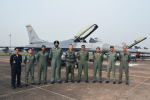Indian Security Forces: Joint Exercises
- Thread starter Ankit Kumar
- Start date
-
- Tags
- indian defence forum
You are using an out of date browser. It may not display this or other websites correctly.
You should upgrade or use an alternative browser.
You should upgrade or use an alternative browser.
It seems camel packs for hydration are becoming more common.
Pics courtesy @Parthu. @randomradio see what I meant by Quarter zip combat t-shirts becoming more and more common.
Pictures from latest addition of Vajra Prahar exercise between Para SF and Rangers (and USSF):


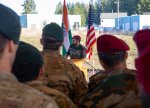

Pictures from latest addition of Vajra Prahar exercise between Para SF and Rangers (and USSF):




@Bon Plan @Picdelamirand-oil
Ex Shakti2019 Indian Army & French Army continue to train hard, familiarizing on each other's weapons & equipment to enhance their joint tactical drills. Both teams also practiced heliborne operations & reflex shooting skills.


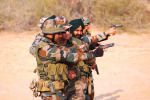

Army has got no chills. They are doing so many exercises with so many people all time. Hopefully we can learn something from them and they can learn something from us.
Ex Shakti2019 Indian Army & French Army continue to train hard, familiarizing on each other's weapons & equipment to enhance their joint tactical drills. Both teams also practiced heliborne operations & reflex shooting skills.




Army has got no chills. They are doing so many exercises with so many people all time. Hopefully we can learn something from them and they can learn something from us.
Upcoming exercise between Indian Navy and Indonesian Navy :
US Pacific Fleet USNS Richard E Byrd and Indian Navy corvette INS Kiltan(P30) connect in South China Sea for underway replenishment. INS Kiltan has been operating in the South China Sea for more than a months all by herself. That little corvette shows far more persistence that much larger Chinese vessels that come to the Indian Ocean, most Chinese vessels leave in less than a week.








Upcoming exercise between Indian Navy and Indonesian Navy :
Indian Navy–Indonesian Navy Bilateral Maritime Exercise ‘Samudra Shakti' is in progress with INS Kamorta ASW Corvette & Indonesian Warship KRI Usman Harun, multi-role Corvette exercising in the Bay of Bengal 06 to 07 Nov 19


Harbour Phase : 04 & 05 Nov 19 included Professional Interactions Subject Matter Expert Exchanges(SMEE), Cross Deck visits, simulator drills, planning conferences, sports fixtures & social interactions.

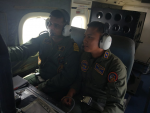
1200 Indian, 500 US soldiers, sailors, airmen to take part in 'Tiger Triumph'
Updated Nov 06, 2019 | 00:06 IST | ANI
This exercise gives U.S. and Indian forces the opportunity to exchange knowledge and learn from each other as well as establish personal and professional relationships.
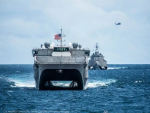
Hyderabad: As many as 1,200 Indian and 500 US soldiers, sailors and airmen will take part in the first-ever Tri-Services India-US Military Exercise called 'Tiger Triumph' scheduled to be held between November 13 and 21 near Visakhapatnam and Kakinada in Andhra Pradesh.
"The exercise will include events and field training that simulate moving humanitarian assistance and disaster relief force from ship to shore.(Or amphibious assault, just saying ) This exercise helps build the capacity of both the Indian and US participants while improving their ability to operate together," an official statement said on Tuesday.
) This exercise helps build the capacity of both the Indian and US participants while improving their ability to operate together," an official statement said on Tuesday.
This exercise gives U.S. and Indian forces the opportunity to exchange knowledge and learn from each other as well as establish personal and professional relationships.
During Tiger Triumph, Indian and US forces will become familiar with one another's aviation support capabilities by conducting cross deck landings by the Indian Air Force on the USS Germantown's flight deck and executing a simulated casualty evacuation from the shore to the acting hospital ship.
All Tiger Triumph training pertains to developing either counter-terrorism or humanitarian assistance and disaster relief capabilities.
"The INS Jalashwa, USS Germantown, INS Airavat, and a survey vessel in a hospital ship role will be participating in Tiger TRIUMPH. US and Indian forces will embark their counterpart's ships during the sea phase to become familiar with each other's tactics, techniques, and procedures," the statement said.
1200 Indian, 500 US soldiers, sailors, airmen to take part in 'Tiger Triumph'
Updated Nov 06, 2019 | 00:06 IST | ANI
This exercise gives U.S. and Indian forces the opportunity to exchange knowledge and learn from each other as well as establish personal and professional relationships.

Hyderabad: As many as 1,200 Indian and 500 US soldiers, sailors and airmen will take part in the first-ever Tri-Services India-US Military Exercise called 'Tiger Triumph' scheduled to be held between November 13 and 21 near Visakhapatnam and Kakinada in Andhra Pradesh.
"The exercise will include events and field training that simulate moving humanitarian assistance and disaster relief force from ship to shore.(Or amphibious assault, just saying
 ) This exercise helps build the capacity of both the Indian and US participants while improving their ability to operate together," an official statement said on Tuesday.
) This exercise helps build the capacity of both the Indian and US participants while improving their ability to operate together," an official statement said on Tuesday.This exercise gives U.S. and Indian forces the opportunity to exchange knowledge and learn from each other as well as establish personal and professional relationships.
During Tiger Triumph, Indian and US forces will become familiar with one another's aviation support capabilities by conducting cross deck landings by the Indian Air Force on the USS Germantown's flight deck and executing a simulated casualty evacuation from the shore to the acting hospital ship.
All Tiger Triumph training pertains to developing either counter-terrorism or humanitarian assistance and disaster relief capabilities.
"The INS Jalashwa, USS Germantown, INS Airavat, and a survey vessel in a hospital ship role will be participating in Tiger TRIUMPH. US and Indian forces will embark their counterpart's ships during the sea phase to become familiar with each other's tactics, techniques, and procedures," the statement said.
1200 Indian, 500 US soldiers, sailors, airmen to take part in 'Tiger Triumph'
Joint Field Training exercise, named Ex Dustlik-2019 is being undertaken by India & Uzbekistan, from 04 -19 Nov, in Uzbekistan.
View attachment 11172
INS Kiltan, a P28 class ASW Corvette, at Jakarta 10 to 12 Nov 19. Part of Eastern Fleet's good-will deployment to the ASEAN & Indo-Pacific. The visit coincides with commemoration of 70 years of India-Indonesia diplomatic relations.Indian Navy–Indonesian Navy Bilateral Maritime Exercise ‘Samudra Shakti' is in progress with INS Kamorta ASW Corvette & Indonesian Warship KRI Usman Harun, multi-role Corvette exercising in the Bay of Bengal 06 to 07 Nov 19
View attachment 11208View attachment 11209
Harbour Phase : 04 & 05 Nov 19 included Professional Interactions Subject Matter Expert Exchanges(SMEE), Cross Deck visits, simulator drills, planning conferences, sports fixtures & social interactions.
View attachment 11210View attachment 11211


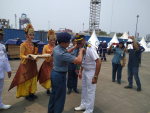

1200 Indian, 500 US soldiers, sailors, airmen to take part in 'Tiger Triumph'
Updated Nov 06, 2019 | 00:06 IST | ANI
This exercise gives U.S. and Indian forces the opportunity to exchange knowledge and learn from each other as well as establish personal and professional relationships.
View attachment 11226
Hyderabad: As many as 1,200 Indian and 500 US soldiers, sailors and airmen will take part in the first-ever Tri-Services India-US Military Exercise called 'Tiger Triumph' scheduled to be held between November 13 and 21 near Visakhapatnam and Kakinada in Andhra Pradesh.
"The exercise will include events and field training that simulate moving humanitarian assistance and disaster relief force from ship to shore.(Or amphibious assault, just saying) This exercise helps build the capacity of both the Indian and US participants while improving their ability to operate together," an official statement said on Tuesday.
This exercise gives U.S. and Indian forces the opportunity to exchange knowledge and learn from each other as well as establish personal and professional relationships.
During Tiger Triumph, Indian and US forces will become familiar with one another's aviation support capabilities by conducting cross deck landings by the Indian Air Force on the USS Germantown's flight deck and executing a simulated casualty evacuation from the shore to the acting hospital ship.
All Tiger Triumph training pertains to developing either counter-terrorism or humanitarian assistance and disaster relief capabilities.
"The INS Jalashwa, USS Germantown, INS Airavat, and a survey vessel in a hospital ship role will be participating in Tiger TRIUMPH. US and Indian forces will embark their counterpart's ships during the sea phase to become familiar with each other's tactics, techniques, and procedures," the statement said.
1200 Indian, 500 US soldiers, sailors, airmen to take part in 'Tiger Triumph'
Above : Tiger Triumph
Below : Triumph Tiger

Final Validation exercise of Indo- French joint Ex Shakti2019 culminated today at Mahajan Ranges Rajasthan Both teams trained & tested their skills in joint CT Ops in a semi desert terrain under the UN mandate.@Bon Plan @Picdelamirand-oil
Ex Shakti2019 Indian Army & French Army continue to train hard, familiarizing on each other's weapons & equipment to enhance their joint tactical drills. Both teams also practiced heliborne operations & reflex shooting skills.
View attachment 11184View attachment 11185View attachment 11186View attachment 11187
Army has got no chills. They are doing so many exercises with so many people all time. Hopefully we can learn something from them and they can learn something from us.




And so it begins :
TIGER TRIUMPH : Maiden India US joint Tri services Humanitarian Assistance & Disaster Relief (HADR) Exercise on the Eastern seaboard, 13 to 21 Nov 2019. IA, IN, IAF, USNavy & USMC participating.

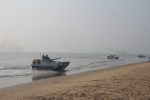

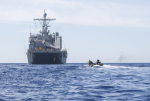
And so it begins :
TIGER TRIUMPH : Maiden India US joint Tri services Humanitarian Assistance & Disaster Relief (HADR) Exercise on the Eastern seaboard, 13 to 21 Nov 2019. IA, IN, IAF, USNavy & USMC participating.
View attachment 11320View attachment 11321View attachment 11322View attachment 11323
Exercise “Tiger Triumph”: US Marines to showcase skills for the first time in India.
By Ajai Shukla
Business Standard, 17th Nov 19
For decades, elite troops of the United States Marine Corps (USMC) have protected Washington’s embassy in New Delhi. On Sunday, for the first time ever, the USMC will showcase its professional skills in India, as the joint US-India tri-service exercise “Tiger Triumph” hits the sea at Kakinada, off Visakhapatnam.
Over the next five days, Indian and American soldiers, sailors, marines and airmen will operate together in a simulated “humanitarian aid and disaster relief” (HADR) situation – jointly providing succour to an Indian Ocean country that has been hit by a natural disaster.
But the HADR scenario is only a convenient backdrop. In fact, the two militaries are honing their capability to work together in an amphibious landing – such as a joint invasion of an enemy coast; or an operation to free one’s own territory that has been captured by an enemy country, a terrorist group, or mercenary force.
Ironically, it was a joint US-Indian HADR effort – in the wake of the Indian Ocean tsunami of 2004 – that birthed the current era of US-India military cooperation. Operating with the Indian Navy to deliver relief to Indonesia and Sri Lanka, the US Navy reported to Washington that here was a regional partner worth having. The next year saw the US-India defence cooperation agreement.
HADR and a real combat beach landing require similar military resources. The Indian side will deploy its biggest amphibious assault ship, INS Jalashwa; a tank landing ship, INS Airavat; and INS Sandhayak, a survey ship that will function as a hospital ship.
The US Task Force will include the naval landing ship USS Germantown, which is equipped with landing craft and amphibious assault vehicles needed to land large numbers of marines onto a beach. Specially trained troops from the Third Marine Expeditionary Force – a specialist unit for combat beach landings – will be accompanied by a medical team.
The exercise will involve sailing from Vishakhapatnam to Kakinada, and then staging a shore landing and setting up a joint command centre and a joint relief and medical camp.
For the Indian Army, this will be a chance to learn from amphibious landing masters, whose tactics date back to the Pacific Campaign in World War II, where they captured one island after another from the Japanese – Midway, Wake Island, Iwo Jima and Guadalcanal.
For the exercise, India is fielding a battalion group, from 19 MADRAS, and BMP-II armoured vehicles from 7 GUARDS. The Indian Air Force (IAF) will deploy one C-130J Super Hercules aircraft, Mi-17 transport helicopters and a Rapid Action Medical Team.
While Exercise Tiger Triumph is an early step in learning, and is therefore being carried out with fewer resources, a full-scale, tri-service beach landing operation is the capability that India is seeking to build.
In such a combat operation, INS Jalashwa, or another Indian landing platform dock (LPD), would carry a battalion of soldiers (850 men), with armoured assault vehicles, to within 30-50 kilometres of the beach, from where smaller, flat-bottomed landing craft mechanised (LCM) would carry the invasion force to the beach.
To protect the invasion force during the beach landing, the Jalashwa’s six helicopters would heli-drop marine commandos behind the enemy troops that are defending the beach. In addition, naval frigates or destroyers would provide fire support, with their 100 millimetre main guns plastering the enemy’s coastal defences. Simultaneously, IAF fighters, operating from shore bases, might also support the beach landing.
Since 2000, the navy’s Maritime Warfare Centre in Visakhapatnam has been refining these tactics. An Indo-US planning exercise, called “Habunag” has coordinated expeditionary HADR activities with the US navy. Now the USMC will have its word.
Broadsword: Exercise “Tiger Triumph”: US Marines to showcase skills for the first time in India
By Ajai Shukla
Business Standard, 17th Nov 19
For decades, elite troops of the United States Marine Corps (USMC) have protected Washington’s embassy in New Delhi. On Sunday, for the first time ever, the USMC will showcase its professional skills in India, as the joint US-India tri-service exercise “Tiger Triumph” hits the sea at Kakinada, off Visakhapatnam.
Over the next five days, Indian and American soldiers, sailors, marines and airmen will operate together in a simulated “humanitarian aid and disaster relief” (HADR) situation – jointly providing succour to an Indian Ocean country that has been hit by a natural disaster.
But the HADR scenario is only a convenient backdrop. In fact, the two militaries are honing their capability to work together in an amphibious landing – such as a joint invasion of an enemy coast; or an operation to free one’s own territory that has been captured by an enemy country, a terrorist group, or mercenary force.
Ironically, it was a joint US-Indian HADR effort – in the wake of the Indian Ocean tsunami of 2004 – that birthed the current era of US-India military cooperation. Operating with the Indian Navy to deliver relief to Indonesia and Sri Lanka, the US Navy reported to Washington that here was a regional partner worth having. The next year saw the US-India defence cooperation agreement.
HADR and a real combat beach landing require similar military resources. The Indian side will deploy its biggest amphibious assault ship, INS Jalashwa; a tank landing ship, INS Airavat; and INS Sandhayak, a survey ship that will function as a hospital ship.
The US Task Force will include the naval landing ship USS Germantown, which is equipped with landing craft and amphibious assault vehicles needed to land large numbers of marines onto a beach. Specially trained troops from the Third Marine Expeditionary Force – a specialist unit for combat beach landings – will be accompanied by a medical team.
The exercise will involve sailing from Vishakhapatnam to Kakinada, and then staging a shore landing and setting up a joint command centre and a joint relief and medical camp.
For the Indian Army, this will be a chance to learn from amphibious landing masters, whose tactics date back to the Pacific Campaign in World War II, where they captured one island after another from the Japanese – Midway, Wake Island, Iwo Jima and Guadalcanal.
For the exercise, India is fielding a battalion group, from 19 MADRAS, and BMP-II armoured vehicles from 7 GUARDS. The Indian Air Force (IAF) will deploy one C-130J Super Hercules aircraft, Mi-17 transport helicopters and a Rapid Action Medical Team.
While Exercise Tiger Triumph is an early step in learning, and is therefore being carried out with fewer resources, a full-scale, tri-service beach landing operation is the capability that India is seeking to build.
In such a combat operation, INS Jalashwa, or another Indian landing platform dock (LPD), would carry a battalion of soldiers (850 men), with armoured assault vehicles, to within 30-50 kilometres of the beach, from where smaller, flat-bottomed landing craft mechanised (LCM) would carry the invasion force to the beach.
To protect the invasion force during the beach landing, the Jalashwa’s six helicopters would heli-drop marine commandos behind the enemy troops that are defending the beach. In addition, naval frigates or destroyers would provide fire support, with their 100 millimetre main guns plastering the enemy’s coastal defences. Simultaneously, IAF fighters, operating from shore bases, might also support the beach landing.
Since 2000, the navy’s Maritime Warfare Centre in Visakhapatnam has been refining these tactics. An Indo-US planning exercise, called “Habunag” has coordinated expeditionary HADR activities with the US navy. Now the USMC will have its word.
Broadsword: Exercise “Tiger Triumph”: US Marines to showcase skills for the first time in India
INS Trikand & MPA P8-I arrived at Doha to participate in the Maiden Indian Navy-Qatari Emiri Naval Forces Bilateral MaritimeExercise Za’ir-Al-Bahr (Roar of the Sea). 17 to 21 Nov 19.
View attachment 11443View attachment 11442View attachment 11441




